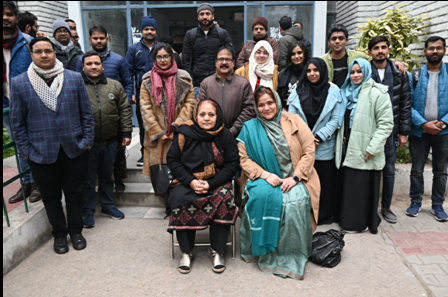Three-Weeks Programme for Research Scholars Concludes
Aligarh: A three-weeks interaction programme for research scholars on the theme “Research Methodology: History, Sources, Methods and Practices” was organised at the Centre of Advanced Study, Department of History, Aligarh Muslim University (AMU), under the aegis of UGC Human Research Development Centre, AMU, following a special grant of UGC to the Department of History as a Centre of Advanced Study.
A total of thirty-six interactive sessions were held relating to the diverse historical themes and issues in online and offline mode. The list of resource persons included prominent historians and scholars mainly from the central universities of India such as the University of Delhi, Indira Gandhi National Open University, Allahabad University and the Jamia Millia Islamia.
A special lecture was delivered by Professor Eugenia Vanina, a Russian Indologist, (Centre for Indian Studies at the Institute of Oriental Studies of the Russian Academy of Sciences) in which she explored the perceptions and interpretations of India’s history through an Orientalist lens, encouraging scholars to critically analyze historical narratives.
Prof. Ravindra Shrivastava (IGNOU) in his talk highlighted that 1960s and 1970s constituted a transformative era in history writing in India, while Professor Farhat Nasreen (JMI) provided practical insights into maintaining integrity, such as proper citation practices, rigorous peer review, and transparent methodologies.
Professor R. P. Bahuguna (JMI) in his lecture presented a critical view of the four generations of the Annales School, discussing the contributions of notable French historians like Farnand Braudel, Georges Duby, Le Roy Ladurie, Roger Chartier, and others. He also expressed concern of Annales School’s limited influence particularly in the writing of medieval Indian history.
Professor Seema Bawa (DU) delivered a lecture on how to read the material artefacts such as the inscriptions and coins along with textual evidences to reconstruct ancient India’s past.
Professor Arif Nazir, Dean, Faculty of Arts, AMU delivered a lecture on the intricacies of thesis writing, highlighting the importance of meticulous preparation of bibliographies and the identification of primary and secondary sources in the context of Hindi and Sanskrit literature.
Prof. Mirza Asmer Beg, Dean Faculty of Social Science discussed qualitative and quantitative research methodologies as the key tools to delve into the complexities of social and political phenomena.
Dr. Monawwer Eqbal (Maulana Azad Library) explained how to access various research support tools and services like JSTOR, Google scholar, plagiarism detection tools, open-access database and other resources available at Maulana Azad Library, AMU.
During the valedictory session of the programme, Professor Gulfishan Khan, Chairperson and Coordinator, Centre of Advanced Study, Department of History and Dr. Faiza Abbasi, Director of UGC-HRDC thanked the participants, resource persons, faculty members and non-teaching staff for their wholehearted support in the programme.

